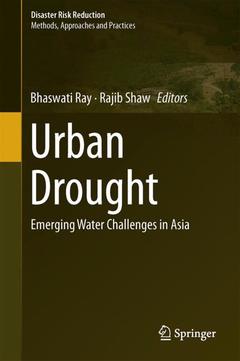Urban Drought, 1st ed. 2019 Emerging Water Challenges in Asia Disaster Risk Reduction Series
Coordonnateurs : Ray Bhaswati, Shaw Rajib

Chapter 1. Defining Urban Water Insecurity: Concepts and Relevance
Bhaswati Ray and Rajib Shaw
Chapter 2. Water Insecurity in Asian Cities
Bhaswati Ray and Rajib Shaw
Chapter 3. Climate Change: Implication on Urban Drought
Bhaswati Ray and Rajib Shaw
Chapter 4. Developing Water Security Index for Urban Areas
Bhaswati Ray and Rajib Shaw
Chapter 5. Water Energy Food Nexus: A Provision to Tackle Urban Drought
Bijon Kumer Mitra, Rajib Shaw, Wanglin Yan and Tomoko Minowa
Chapter 6. Coping with Scarcity and Urban Water Governance: Case of Udon Thani’s City Region
Wijitbusaba (Ann) Marome
Chapter 7. Bridging the Distances between Far Water and Near Water: Case of Yanagawa City from Japan
Shimpei Iwasaki
Chapter 8. Resilience to Water Related Disaster: Risks, Vulnerabilities and Coping Strategies in Dhaka
Md. Anwarul Abedin and Mohammad Golam Kibria
Chapter 9. Resilience Perspective for Planning Urban Water Infrastructure: A Case of Nagpur City
Sameer Deshkar
Chapter 10. Urban Droughts in India: Case study of Delhi
Shyamli Singh and Vinod K. Sharma
Chapter 11. Future Urban Crisis in Mountain Regions: Example of Kathmandu Valley, Nepal
Basanta Raj Adhikari, Suresh Das Shrestha and Narendra Man Shakya
Chapter 12. Drought and Urbanization: The Case of the Philippines
Emma Porio, Jessica Dator-Bercilla, Gemma Narisma, Faye Cruz, Antonia Yulo-Loyzaga
Chapter 13. Coping with urban water insecurity in the colonial city of Kolkata and implications on Sustainable Development Goals
Bhaswati Ray and Rajib Shaw
Chapter 14. Urban Drought Management through Water Conservation: Issues, Challenges and Solutions
Kapil Gupta and Vinay Nikam
Chapter 15. Urban Water and Health Issues in Hong Kong
Emily Ying Yang Chan and Janice Ying-en Ho
Chapter 16. Urban Water Issues in the Megacity of Tehran
Ali Ardalan, Mona Khaleghy Rad andMahdi Hadi
Chapter 17. Soil Sealing and Depleting Groundwater in Rapidly Growing Peshawar City District, Pakistan
Atta-ur-Rahman, Attaullah Khan, Noorul Haq, Samiullah and Rajib Shaw
Chapter 18. Adaptive Policy Responses in Managing Urban Water Crisis in Sri Lanka
A.J.M.K.K. Aviruppola and K.W.G. Rekha Nianthi
Chapter 19: Preparing for the Future: Challenges in Water Management in Colombo, Sri Lanka
Deepthi Wickramasinghe
Chapter 20. Water challenges in Ulaanbaatar, Mongolia
Serjmyadag Dalai, Ouynbaatar Dambaravjaa and Gomboluudev Purevjav
Chapter 21: Water Scarcity in Himalayan Hill Town: A Study of Darjeeling Municipality, India
Tarun Kumar Mondal and Paramita Roychowdhury
Chapter 22: Urban Water Governance: Pricing of Water for the Slum Dwellers of Dhaka Metropolis
Mahfuzul Haque
Chapter 23: Urban Water Management Issues and Challenges of Post The 2004 Indian Ocean Tsunami Recovery: Lessons Learned from Banda Aceh City, Indonesia
Alfi Rahman, Shimpei Iwasaki, Stephen Anthony Sutton, Aiko Sakurai and Parmakope
Chapter 24: Implications of Water Insecurity and Future Prospects in Asian Cities
Bhaswati Ray and Rajib Shaw
Date de parution : 01-2019
Ouvrage de 427 p.
15.5x23.5 cm



